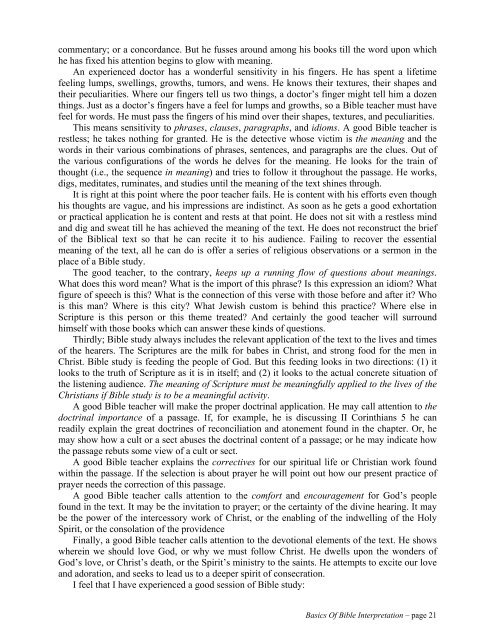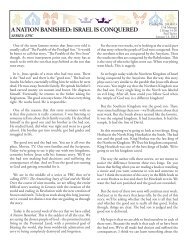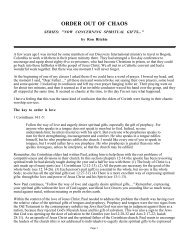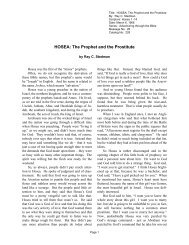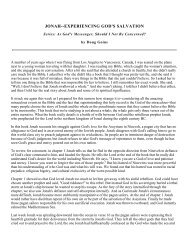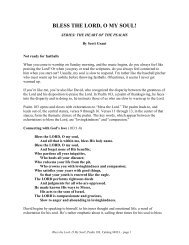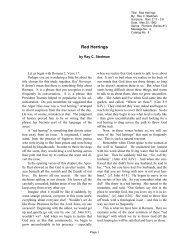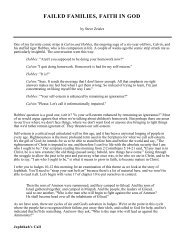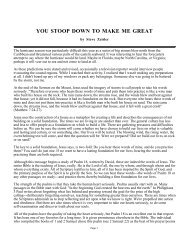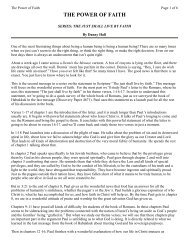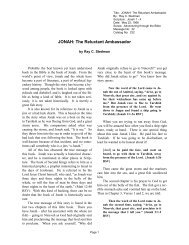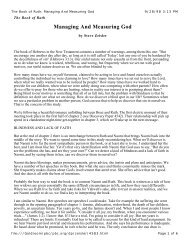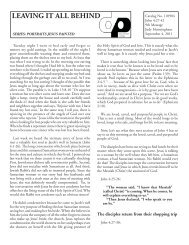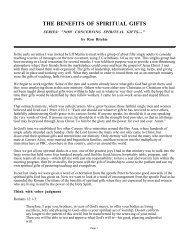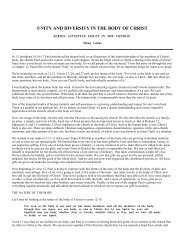Basics of Bible Interpretation - RayStedman.org
Basics of Bible Interpretation - RayStedman.org
Basics of Bible Interpretation - RayStedman.org
Create successful ePaper yourself
Turn your PDF publications into a flip-book with our unique Google optimized e-Paper software.
commentary; or a concordance. But he fusses around among his books till the word upon which<br />
he has fixed his attention begins to glow with meaning.<br />
An experienced doctor has a wonderful sensitivity in his fingers. He has spent a lifetime<br />
feeling lumps, swellings, growths, tumors, and wens. He knows their textures, their shapes and<br />
their peculiarities. Where our fingers tell us two things, a doctor’s finger might tell him a dozen<br />
things. Just as a doctor’s fingers have a feel for lumps and growths, so a <strong>Bible</strong> teacher must have<br />
feel for words. He must pass the fingers <strong>of</strong> his mind over their shapes, textures, and peculiarities.<br />
This means sensitivity to phrases, clauses, paragraphs, and idioms. A good <strong>Bible</strong> teacher is<br />
restless; he takes nothing for granted. He is the detective whose victim is the meaning and the<br />
words in their various combinations <strong>of</strong> phrases, sentences, and paragraphs are the clues. Out <strong>of</strong><br />
the various configurations <strong>of</strong> the words he delves for the meaning. He looks for the train <strong>of</strong><br />
thought (i.e., the sequence in meaning) and tries to follow it throughout the passage. He works,<br />
digs, meditates, ruminates, and studies until the meaning <strong>of</strong> the text shines through.<br />
It is right at this point where the poor teacher fails. He is content with his efforts even though<br />
his thoughts are vague, and his impressions are indistinct. As soon as he gets a good exhortation<br />
or practical application he is content and rests at that point. He does not sit with a restless mind<br />
and dig and sweat till he has achieved the meaning <strong>of</strong> the text. He does not reconstruct the brief<br />
<strong>of</strong> the Biblical text so that he can recite it to his audience. Failing to recover the essential<br />
meaning <strong>of</strong> the text, all he can do is <strong>of</strong>fer a series <strong>of</strong> religious observations or a sermon in the<br />
place <strong>of</strong> a <strong>Bible</strong> study.<br />
The good teacher, to the contrary, keeps up a running flow <strong>of</strong> questions about meanings.<br />
What does this word mean? What is the import <strong>of</strong> this phrase? Is this expression an idiom? What<br />
figure <strong>of</strong> speech is this? What is the connection <strong>of</strong> this verse with those before and after it? Who<br />
is this man? Where is this city? What Jewish custom is behind this practice? Where else in<br />
Scripture is this person or this theme treated? And certainly the good teacher will surround<br />
himself with those books which can answer these kinds <strong>of</strong> questions.<br />
Thirdly; <strong>Bible</strong> study always includes the relevant application <strong>of</strong> the text to the lives and times<br />
<strong>of</strong> the hearers. The Scriptures are the milk for babes in Christ, and strong food for the men in<br />
Christ. <strong>Bible</strong> study is feeding the people <strong>of</strong> God. But this feeding looks in two directions: (1) it<br />
looks to the truth <strong>of</strong> Scripture as it is in itself; and (2) it looks to the actual concrete situation <strong>of</strong><br />
the listening audience. The meaning <strong>of</strong> Scripture must be meaningfully applied to the lives <strong>of</strong> the<br />
Christians if <strong>Bible</strong> study is to be a meaningful activity.<br />
A good <strong>Bible</strong> teacher will make the proper doctrinal application. He may call attention to the<br />
doctrinal importance <strong>of</strong> a passage. If, for example, he is discussing II Corinthians 5 he can<br />
readily explain the great doctrines <strong>of</strong> reconciliation and atonement found in the chapter. Or, he<br />
may show how a cult or a sect abuses the doctrinal content <strong>of</strong> a passage; or he may indicate how<br />
the passage rebuts some view <strong>of</strong> a cult or sect.<br />
A good <strong>Bible</strong> teacher explains the correctives for our spiritual life or Christian work found<br />
within the passage. If the selection is about prayer he will point out how our present practice <strong>of</strong><br />
prayer needs the correction <strong>of</strong> this passage.<br />
A good <strong>Bible</strong> teacher calls attention to the comfort and encouragement for God’s people<br />
found in the text. It may be the invitation to prayer; or the certainty <strong>of</strong> the divine hearing. It may<br />
be the power <strong>of</strong> the intercessory work <strong>of</strong> Christ, or the enabling <strong>of</strong> the indwelling <strong>of</strong> the Holy<br />
Spirit, or the consolation <strong>of</strong> the providence<br />
Finally, a good <strong>Bible</strong> teacher calls attention to the devotional elements <strong>of</strong> the text. He shows<br />
wherein we should love God, or why we must follow Christ. He dwells upon the wonders <strong>of</strong><br />
God’s love, or Christ’s death, or the Spirit’s ministry to the saints. He attempts to excite our love<br />
and adoration, and seeks to lead us to a deeper spirit <strong>of</strong> consecration.<br />
I feel that I have experienced a good session <strong>of</strong> <strong>Bible</strong> study:<br />
<strong>Basics</strong> Of <strong>Bible</strong> <strong>Interpretation</strong> – page 21


